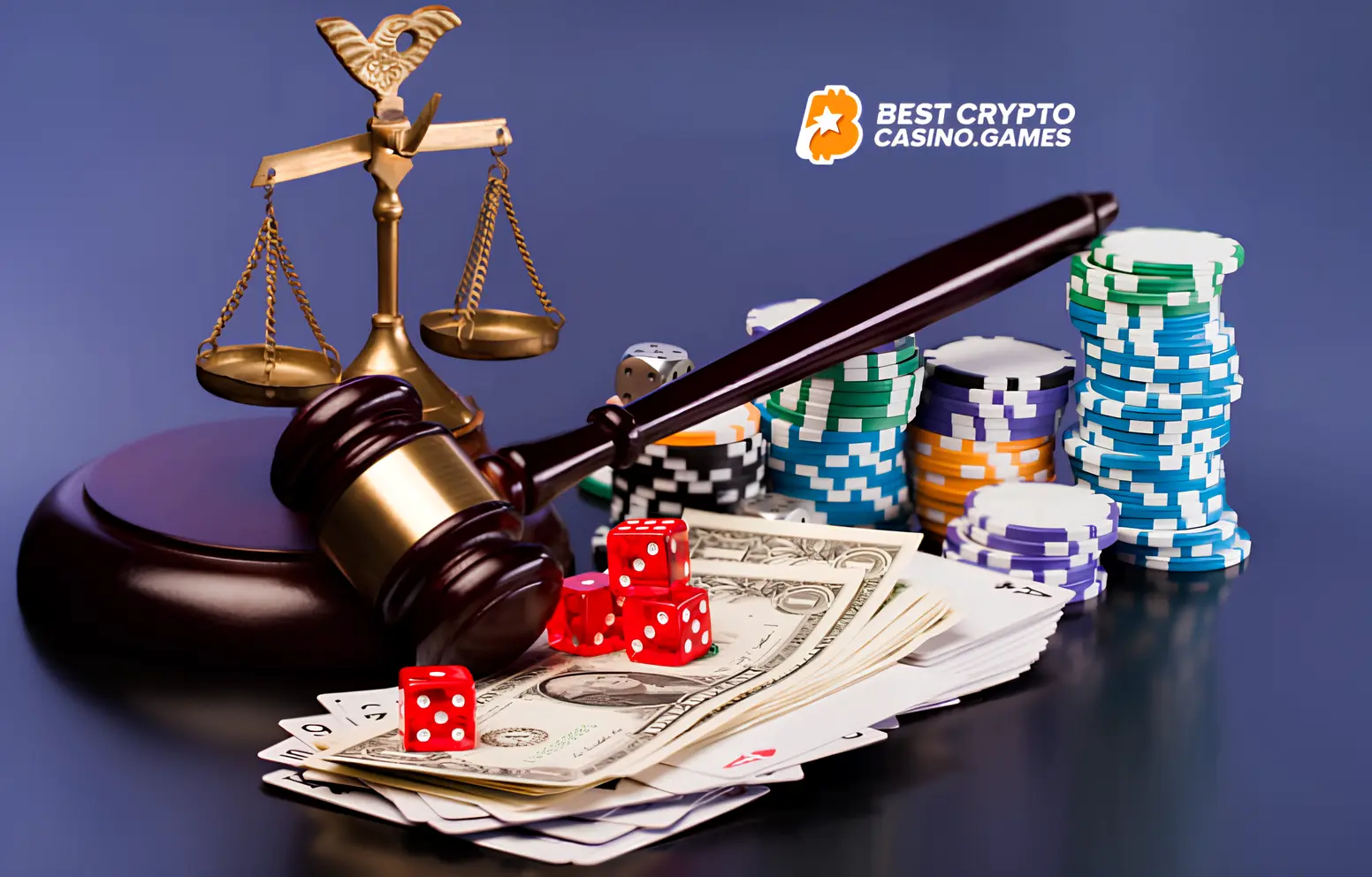States Where Gambling Is Illegal and Restricted

Ever wondered what states is gambling illegal in or which jurisdictions restrict gambling the most? In the United States, gambling laws differ from one state to another, with each region deciding how permissive or restrictive it wants to be. While some states view betting as an opportunity to boost public revenue, others remain firmly opposed, often due to cultural, religious, or economic reasons. If you’re interested in alternative gambling formats, you can explore Best Crypto Casino Games, an aggregator of reputable crypto casinos offering access to secure platforms and informational resources. Let’s take a closer look at gambling illegal states, how regulations vary, and what the future might hold for evolving gambling legislation in America.
A Snapshot of US Gambling Laws
The U.S. has no singular federal law outlawing gambling across the board. Instead, the federal government provides general guidance, particularly on issues like sports betting or internet-based gambling across state lines. Ultimately, each state exercises control over legal forms of gambling within its borders. For instance, while one state might welcome land-based casinos, the neighboring one may prohibit even a state lottery. This decentralized model means that regional culture, economic reliance, and voter sentiment heavily influence policy. Religious or conservative communities often oppose gambling, while states looking to fund public services may legalize specific forms like lotteries or sports wagering.
Key Factors Behind Restrictions
The list of states where gambling is illegal or highly restricted often reflects deeper values or concerns. Ethical objections, fear of social disruption, and the desire to maintain a community’s character frequently drive restrictive laws. Critics cite gambling as a source of financial instability, crime, and addiction, while supporters argue for regulated systems that reduce harm and increase state revenues. In many areas, the push-and-pull of moral judgment and economic opportunity fuels ongoing legislative debates.
The Patchwork of US Gambling
What makes the U.S. unique is the inconsistency of gambling laws. Cross a state border, and the legal status of a game might change instantly. Some states endorse online wagering but restrict physical casinos, while others welcome land-based venues but have yet to authorize digital platforms. This fragmented legal environment requires players to stay informed, especially those participating in remote or mobile betting. The situation becomes even more nuanced when tribal gaming operations and local licensing conditions are factored in.
States Where Gambling Is Illegal or Heavily Limited
Curious about what states don’t have casinos? States like Utah, Hawaii, and Alaska have opted out of hosting commercial or tribal casino venues. Many users can’t understand what states don’t allow gambling and why: because their leaders often prioritize tourism, nature, or traditional values over introducing gambling operations. In wealthy states, the fiscal need to tax gambling revenues may not exist, reducing the political pressure to open casinos. Even when casino development could generate jobs, many communities question whether the long-term social costs outweigh the short-term gains. Here’s a list of states without casinos or with certain restrictions:
- Georgia permits only state-run lotteries and private social poker games without entry fees or rakes.
- South Carolina allows the lottery and limited charitable gambling, but outlaws most casino-style operations.
- Tennessee permits sports betting but forbids physical casinos, slot machines, and live poker rooms.
- Alaska maintains its ban on commercial gambling, allowing only charitable games and tribal operations in narrow contexts.
- Alabama has three tribal casinos and pari-mutuel dog racing, but traditional commercial casinos remain illegal.
- Idaho permits video gaming terminals on tribal lands, but live poker and table games are not allowed outside those reservations.
- Kentucky allows horse racing and a lottery but bans casino gambling and most table games.
- Vermont offers only a state lottery and occasional charitable events like bingo or raffles.
In many of these places, local culture and legislative caution have kept broader gambling expansion at bay. Whether due to religious influence, economic priorities, or social conservatism, these states maintain policies that tightly regulate or outright ban casino-style entertainment.
Partial Restrictions Across Gambling Categories
While some states take a strict stance against all forms of betting, others apply partial bans, creating a patchwork of allowed and prohibited activities. A state may embrace one format, like lotteries or sports betting, while blocking others, such as online poker or slot machines. For example:
- Minnesota permits off-track betting and tribal casinos but restricts commercial casino development.
- Florida has tribal casinos and a lottery, but commercial casinos remain off-limits.
- Nebraska only recently began to expand its gambling options after years of allowing just keno, a state lottery, and charitable bingo.
- Texas prohibits casinos but allows pari-mutuel wagering on horse and dog races, with significant restrictions.
This layered approach shows how gambling legality isn’t always a simple yes or no – often, it depends on the type of gambling in question.
How Many States is Gambling Illegal or Allowed
| State | Casinos | Lottery | Sports Betting | Online Gambling |
|---|---|---|---|---|
| Utah | ❌ Illegal | ❌ Illegal | ❌ Illegal | ❌ Illegal |
| Hawaii | ❌ Illegal | ❌ Illegal | ❌ Illegal | ❌ Illegal |
| Alaska | ❌ No commercial casinos | ⚠️ Limited | ❌ Illegal | ❌ Illegal |
| Georgia | ❌ No casinos | ✅ State lottery | ❌ Illegal | ❌ Illegal |
| Alabama | ❌ No commercial casinos | ⚠️ Limited | ❌ Illegal | ❌ Illegal |
| Tennessee | ❌ No casinos | ✅ State lottery | ✅ Legal (Online only) | ⚠️ Online sports betting only |
| Kentucky | ❌ No casinos | ✅ State lottery | ✅ Legal (Limited) | ❌ Illegal |
| Vermont | ❌ No casinos | ✅ State lottery | ❌ Illegal | ❌ Illegal |
| Florida | ✅ Tribal Only | ✅ State lottery | ✅ Legal (Online only) | ⚠️ Online sports betting only |
| South Carolina | ❌ No casinos | ✅ State lottery | ❌ Illegal | ❌ Illegal |
| Virginia | ✅ Casinos in development | ✅ State lottery | ✅ Legalized | ⚠️ Limited online options |
| Idaho | ✅ Tribal only | ✅ State lottery | ❌ Illegal | ❌ Illegal |
| Texas | ❌ No commercial casinos | ✅ State lottery | ⚠️ Very limited exceptions | ❌ Illegal |
| Minnesota | ✅ Tribal only | ✅ State lottery | ⚠️ Limited (in-person only) | ❌ Illegal |
| Nebraska | ⚠️ Limited | ✅ State lottery | ✅ Recently legalized | ❌ Illegal |
Future Outlook for Gambling Laws
The rapid expansion of sports betting across the country has influenced conservative states to revisit their gambling positions. More jurisdictions are reevaluating old prohibitions in light of public demand and economic opportunity. Meanwhile, the rise of crypto casino sites adds another dimension. Lawmakers now face questions around anonymous play, blockchain verification, and digital taxation. As more platforms offer crypto games, there’s increasing pressure to regulate this new sector without stifling innovation. The crypto space also brings forward issues like licensing clarity, anti-money laundering measures, and player protections, all of which will shape the legislative conversations ahead, especially in what states prohibit gambling but now face increased pressure to reconsider their stance.
The Digital Divide in State Gambling Laws
Online gambling presents a unique legal gray area across the United States. While some states have implemented clear frameworks for internet-based betting platforms, others lag behind or offer vague guidelines. In certain regions, online casinos operate offshore and serve American players without formal regulation, creating uncertainty around legality and consumer protections. This uneven oversight means that two people accessing the same site from different states could face very different legal situations.
For players, this emphasizes the importance of understanding not just state laws but also how those laws apply to digital platforms. This is especially critical in states without gambling infrastructure that might still lack legal clarity on internet betting. Before starting to play at an online casino, players should familiarize themselves with the rules in detail and choose only reliable gambling sites.
Smart Gambling in a Fragmented Legal Landscape
Whether you’re traveling across the U.S. or engaging online, understanding the local legal landscape is essential. Gambling legality can vary not just by state, but even by county. That’s why it’s crucial to check local laws, including age limits, game-specific restrictions, and venue licenses. What states don’t allow casinos may still offer other legal formats like lotteries or charity games, adding to the complexity. International visitors might find the U.S. setup confusing compared to countries where gambling is centrally regulated. Regardless of where you play, adopting responsible gambling habits, such as setting personal limits and using verified platforms, can enhance the experience and minimize risk.
Conclusion and Key Takeaways
So, where is gambling illegal in America? Only a few states maintain outright bans, with Utah and Hawaii leading that list. In others, the activity is allowed in a very limited way. If you’re researching is gambling illegal in America, the answer varies by state and often depends on specific game types and formats. Legal environments are evolving fast, and crypto platforms further complicate the map. Ultimately, whether you’re researching gambling-free states or are interested in the new platforms featured on Best Crypto Casino Games, staying informed and up-to-date on all the latest developments in the gambling industry is the smartest decision you can make.



